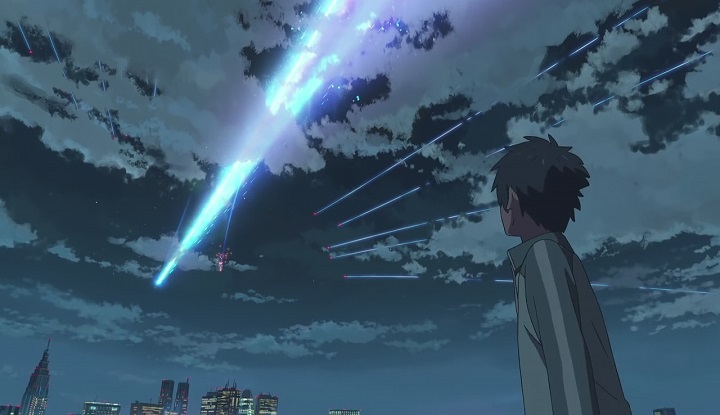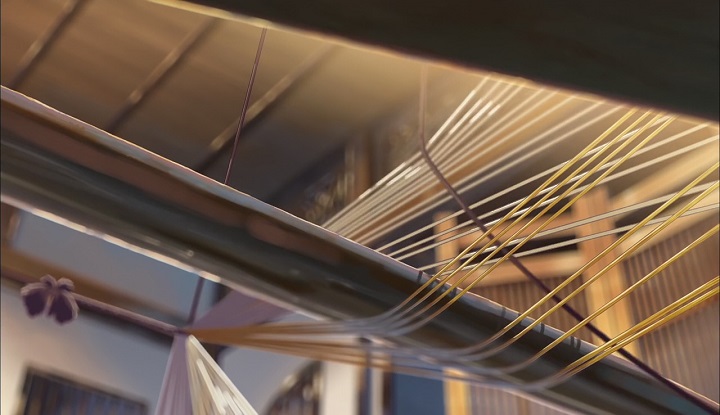Time will unbind our memory glue
and I’ll be as nobody-ish as all of you. — Marceline


The most beautiful aspect of Your Name (Kimi no Na wa) is how it weaves its various themes to form a coherent labyrinthine story, waiting to be untangled by the unsuspecting viewer. Its take on the body swap plot allows for much more complexity and poignancy. The film also integrates seamlessly two main threads—the struggle against a terrific fate and the love between the two leads.
A major theme is the impermanence of memory. Mitsuha and Taki both describe recollections of their body-swapping escapades as dreamlike. Details are progressively blurred until memories fade entirely. In the first two acts, this transience gives a sense of levity and wonder. However, by the third act, the disappearing memories and records have given rise to impending loss, especially in the context of the film’s non-linear timeline. Mitsuha thus has to mobilize an evacuation plan before the comet breaks, and Taki has to get his message to Mitsuha before he forgets everything. The suspense is palpable in their race against time.

Although Mitsuha and Taki successfully avert disaster, in their last ephemeral moment in each other’s body, they left no trace of the events ever happening. No record, no name, no memory. All that is left is a lingering vague feeling that something good is now lost.

The two would eventually meet again, but it feels regretful that none remembers the incredible series of phenomenons that once brought them together. At the end of the film, they are—despite all that happened—mere strangers. However, Your Name finds comfort in the idea that there is a cosmic knot between things: Musubi. Indeed, it is possible that our love persists even without memories of events. There are accounts of people without autobiographical memory.1 Though unable to recall any past experiences, most of these individuals have healthy relationships and passionate lives.2 Likewise, Mitsuha and Taki are able to recognize each other without knowing whence.
My initial thoughts after the movie was that it is fifteen minutes too long—the resolution of Mitsuha and Taki’s seemingly irretrievable romance dragged. Still, the final scene is that much more powerful for it. The slow monotony built in that quarter of an hour is contrasted with a sudden meeting, frantic search, hesitation, near-miss, and finally, love.
“The slow monotony built in that quarter of an hour is contrasted with a sudden meeting, frantic search, hesitation, near-miss, and finally, love.”
I love this final phrase. Funnily enough this sequence you describe that is flashed before us right at the end of the film is exactly the same sequence that the film takes us through in its entirety. I think it’s rather gratifying seeing all these emotions that were built up through the length of the film, condensed and given a catharsis right at the end. It’s a circle. It’s a story of fate. It’s musubi.
Beautiful post as always Yi.
Thank you! ^ ^
Musubi. This word has profound meaning. Tying thread is Musubi. Connecting people is Musubi. The flow of time is Musubi.
I think this concept is one of things that made Your Name a truly magical and mystical movie.
I have found myself randomly recalling this word since I have watched the movie a good 15 times since it came out, but only ever in the voice of Mitsuha’s grandmother. Her dialogue about musubi is this comforting, wonderful thing that always reminds me of a little elderly Lady whose lawn I mowed during the summer when I was kid.
This movie is literally the epitome of nostalgia, or as stated in Portuguese, saudade. Like musubi, saudade embodies so much more than the mere word than can be expressed in one word. But I digress. I happened to find your description here, and thought it quite wonderful. You did a brilliant job of expressing thoughts behind musubi, and the movie itself. Although Makoto Shinkai was taken completely by surprise at how accepted and beloved his movie became (he actually said that he didn’t think the movie was finished completely, and should have been longer), I believe Kimi no na Wa will remain a staple anime movie. If you haven’t seen them, I highly recommend Byôsoku 5 senchimêtoru (5 Centimeters per Second), Koto no ha no niwa (Garden of Words) and Kumo no mukô, yakusoku no basho (The Place Promised in Our Early Days). Each one is a tour de force of emotion, and proves Makoto Shinkai is a master of nostalgia. I would love to read your take on them. Especially 5 Centimeters per Second and Garden of Words. 🙂
Thank you !